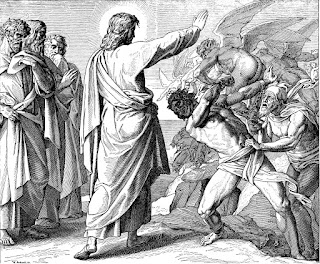Repetition in the Scripture, either of specific words, themes, or similar events is one of the things we look for as we observe the text. If it is the case that the Holy Spirit is behind the authors of the original manuscripts, as asserted by both Paul (2 Timothy 3:14 – 17) and Peter (2 Peter 1:20 - 21), then the repletion has purpose and we need to see if we can determine that purpose.
I have been reading in Mark and noticed a couple of similar scenes. Look at Mark 1:21 – 28 and Mark 5:1 – 20. In both cases Jesus confronts unclean spirits, demons, who acknowledge His identity, His authority over them even to destroy them, and thus obey His commands to them. In both of these scenes there is dialog between the demons and Christ. They beg Him not to torment them.
The religious leaders at that time, the scribes, the Sadducees, and the Pharisees, did not acknowledge His identity, His authority over them even to destroy them, nor did they obey Him. Unlike the demons, the religious leaders resisted Christ and plotted to kill Him.
In this case the demons were right and the religious leaders were wrong. What, I wonder, are the implications of this contrast?
I have been reading in Mark and noticed a couple of similar scenes. Look at Mark 1:21 – 28 and Mark 5:1 – 20. In both cases Jesus confronts unclean spirits, demons, who acknowledge His identity, His authority over them even to destroy them, and thus obey His commands to them. In both of these scenes there is dialog between the demons and Christ. They beg Him not to torment them.
The religious leaders at that time, the scribes, the Sadducees, and the Pharisees, did not acknowledge His identity, His authority over them even to destroy them, nor did they obey Him. Unlike the demons, the religious leaders resisted Christ and plotted to kill Him.
In this case the demons were right and the religious leaders were wrong. What, I wonder, are the implications of this contrast?

No comments:
Post a Comment